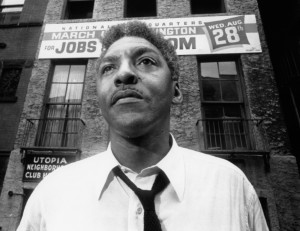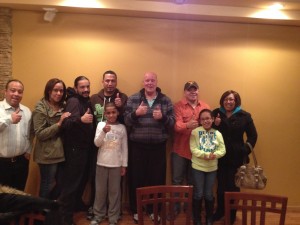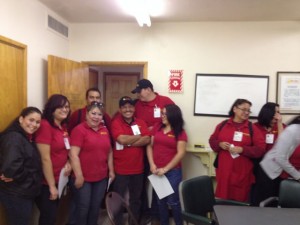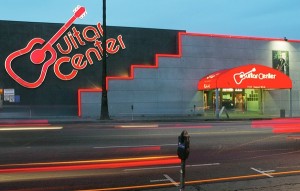February 3, 2014
This Black History Month, We Honor Bayard Rustin
February once again marks the beginning of Black History Month–a time to remember and celebrate the rich history of African Americans and the achievements of the Civil Rights Movement.
One of the greatest moments of the Civil Rights era was the March on Washington in 1963–one of the largest non-violent protests to ever occur in America. The March on Washington brought thousands of people of all races together, in the name of equal rights for everyone–whether they were black or white, rich or poor, Muslim or Christian. Dr. Marin Luther King, Jr. made one of his most inspiring and famous speeches at the march, which culminated on the National mall.
But history has often overlooked the man who was the driving force behind this monumental event–a man named Bayard Rustin. Rustin was the one who organized the march, bringing methods used by Gandhi as well as the Quaker religion to Washington to ensure peace, but also impact. It was Rustin who helped shape Dr. King into the iconic symbol of peace he is remembered as.
As a young adult, Rustin worked with many kinds of people who influenced his activism, including ministers and labor organizers. During World War II, Rustin fought against racial discrimination in war-related hiring, and was later jailed for two years after refusing to enter the draft. Then, after protesting segregated transit systems, he was sentenced to work on a chain gang for several weeks.
Despite being punished for his beliefs, Rustin continued to work towards changing things for the better. In 1953, Bayard Rustin arrived in Montgomery, Alabama to partake in the famous bus boycott that kicked off after Rosa Parks was arrested after refusing to give up her seat on the bus for a white man. The boycott brought many civil rights leaders to the area, including a young Dr. Martin Luther King, who had not yet embraced non-violence. But Rustin taught many who were partaking in the boycott how Gandhi had used peaceful tactics to bring change in India, and people saw the importance of these tactics, and began to embrace them, focusing on direct protest.
Rustin was also a champion of workers rights. In 1965, Rustin and his mentor A. Philip Randolph co-founded the A. Philip Randolph Institute, a labor organization for African-American trade union members.
Although Bayard Rustin was a tireless activist, his life achievements are unknown to many, and he has even been called the “lost prophet” of the civil rights movement. This is largely because not only was Rustin silenced and threatened like many others were for being a black man speaking out for equal rights, but also because he was openly gay in a time when homophobia and bigotry was rampant. Rustin continued his life as an openly gay man, even after being incarcerated for it, and is seen as a champion of the LGBT movement still today. Despite being beaten, arrested, jailed, and fired from various leadership positions, Rustin overcame and made a huge impact on the civil and economic rights movements.
America has a long way to go before Rustin’s dreams of equal human rights for all are achieved, but without him, we perhaps would not be where we are today. Today, we have a black president, more women in leadership positions, and more of legislation in the states overturning old and outdated laws barring gay couples from marrying. These are just a few examples of the progress our country has made since Rustin’s time, and working people will continue to work so that ALL people have equal rights–at work and at home.
November 20, 2013
JBS Workers Vote for a Union Voice on the Job with UFCW Local 1776
This work, about 200 workers in a JBS rendering plant in Souderton, Pa., overwhelmingly voted for a union voice on the job with UFCW Local 1776.
“I have been a driver at JBS for three years and one reason why I wanted a union was to have better health insurance for my family. When it came time to vote, I stood with my co-workers and voted union ‘yes’,” said JBS worker Tony Serra.
The workers began campaigning to join a union at the beginning of this year. During the campaign, UFCW Locals 23, 204, 1994, and 1208 sent member activists to help UFCW Local 1776 members and JBS workers to handbill, hold worker-to-worker and member-to-worker meetings, and perform home calls to show solidarity and have a successful election. Many of the workers have been part of a union before and understand the power that workers have when they stand together.
Contract negotiations are set to begin immediately in order to run parallel with negotiations for the UFCW Local 1776 JBS beef plant workers. Respect on the job and protecting healthcare benefits are top priorities for workers.
October 31, 2013
Factor Sales Grocery Workers Say “Yes” to a Union Voice with UFCW Local 99
Last week, 360 Factor Sales grocery workers in Yuma, Ariz., joined UFCW Local 99 through a card check process that allowed them to have a free and fair choice. Workers at nine grocery stores stayed united throughout the campaign by communicating with each other through Facebook, text messages, and worker meetings.
Workers said they wanted a union voice so they would have dignity and respect on the job, a way to solve problems at work, and improvements in pay and benefits.
“Finally we have a voice, respect and dignity at work,” said Lupita Iniguez, a Factor Sales worker.
Workers have been fighting for better jobs and to be a part of a union since 2004. The successful card check follows the workers’ two previous attempts to join a union. In the two other card checks, the company was charged with unfair election practices by the NLRB.
“Congratulations to the many workers whose lives were changed today. Their hard work and dedication paid off,” said UFCW Local 99 President Jim McLaughlin.
Factor Sales operates Del Sol and King Market grocery stores.
October 30, 2013
Costco an Example of the “Union Difference”
This week, during a speech about poverty, Labor Secretary Thomas Perez praised Costco, a union store, for its business practices, which continually pay its employees living wages, and continue to yield profits. According the Huffington Post, Perez joined the long list of Costco admirers when he stated that Costco proves the notion of the service industry having to adhere to a minimum-wage business model to be wrong, and “phooey”.
 Secretary Perez is right–in an industry that employs millions of working poor, whom struggle to make ends meet on a daily basis, Costco is a shining light. The wholesale retailer is known for low employee turnover, thanks to its wages that allow people to actually make a living, and its health benefits. Costco values its workers–without them, the company couldn’t be the success that it is. These ideals are embodied in Costco cofounder Jim Sinegal and former CEO. In his speech, Secretary Perez remembered:
Secretary Perez is right–in an industry that employs millions of working poor, whom struggle to make ends meet on a daily basis, Costco is a shining light. The wholesale retailer is known for low employee turnover, thanks to its wages that allow people to actually make a living, and its health benefits. Costco values its workers–without them, the company couldn’t be the success that it is. These ideals are embodied in Costco cofounder Jim Sinegal and former CEO. In his speech, Secretary Perez remembered:
“I went to a [Costco] grand opening in Northern Virginia. The woman who was the manager at that store, she started out pushing carts, to use her term. And the remarkable loyalty that they have to Jim is a function of the fact that he categorically rejects the notion that, ‘I either take care of my shareholders or my workers’. That is a false choice.”
But part of the reason Costco’s workers are making good wages and receive benefits is due to the fact that over 15,000 of its workers are unionized. Organized by the Teamsters, Costco is union-friendly and meets workers on an even playing field when it comes to bargaining, and as union members, they have a say in the terms and conditions of their employment. For more than 20 years, they have stood together to ensure their rights as workers are protected.
The union-difference is huge. UFCW members work at grocery stores, retailers, and packing and processing plants all across the country. As union members, they are able to stand together and bargain for decent wages that allow them to feed their families and pay their bills, unlike Walmart, which pays such low wages that many of its associates must choose between shelter or food. Union jobs are good, middle class jobs, that provide healthcare, sick-leave, and retirement benefits. When workers stand together, like at Costco, or at UFCW shops like Kroger and Macy’s, they have a powerful voice that can stand up to that of the company.
October 30, 2013
Member Spotlight: Matilde Reyes, Bestway Worker
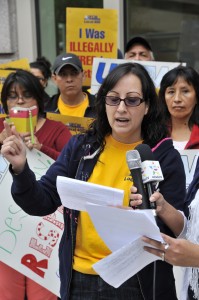 Workers at Bestway, a Latino supermarket in the Falls Church, Va. suburb of Washington, D.C. came together in September to form a union at their work. However, their company ignored their requests to bargain and instead engaged in systematic illegal retaliation against union supporters by cutting hours, changing schedules, holding one-on-one interrogation meetings and threatening to call immigration on the workers. But workers at Bestway stayed strong and held together and staged a work stoppage to protest the company’s illegal conduct. The company responded by firing 31 workers in attempt to silence the workers.
Workers at Bestway, a Latino supermarket in the Falls Church, Va. suburb of Washington, D.C. came together in September to form a union at their work. However, their company ignored their requests to bargain and instead engaged in systematic illegal retaliation against union supporters by cutting hours, changing schedules, holding one-on-one interrogation meetings and threatening to call immigration on the workers. But workers at Bestway stayed strong and held together and staged a work stoppage to protest the company’s illegal conduct. The company responded by firing 31 workers in attempt to silence the workers.
The workers continued to hold strong against the company threats and intimidation. They staged a daily picket line outside the store to educate customers on the unfair treatment and violations of labor law.
After seeing a noticeable decrease in business, Bestway reached an agreement with workers to reinstate all terminated workers, recognize UFCW Local 400 as their union, provide back pay to terminated workers, and begin contract negotiations with workers this week. Metilde Reyes is one of those workers.
Metilde Reyes is a mother of three that has worked at Bestway for 13 years. The company calls her a “supervisor,” but she gets no extra pay or better treatment from her position. She works to make sure the cashiers work together to check customers out and to void merchandise when necessary.
When Bestway illegally fired her coworkers for standing up, they offered her extra money and more hours to train their replacements, instead, she joined her coworkers in protesting in front of her store.
“I do love my job” said Metilede, “but I love my people more. I had to come out and support them.”
Together, Bestway workers like Metilde are negotiating for better wages, benefits and working conditions. But that’s just the beginning of their journey – they’re now working to show workers at other Bestway stores what’s possible when workers come together.
“I can’t wait for the day when workers at all Bestway Supermercados get the same rights that we now have at our store,” said Metilde.
October 23, 2013
Update: Bestway Workers Win Union Recognition with UFCW Local 400

Bestway grocery workers in Virginia went back to work after being illegally fired in retaliation for forming a union.
On Monday, 31 workers at a Bestway supermarket in Falls Church, Virginia, went back to work after being illegally fired in retaliation for forming a union. The workers picketed their store for more than ten days before reaching an agreement with Bestway last week to reinstate the workers and begin negotiations for their first union contract.
“We are so happy to be going back to work today,” said Matilde Reyes, a veteran worker who has been with Bestway for more than 13 years. “Bestway has agreed to respect us and follow the laws that protect workers’ rights. I can’t wait for the day when workers at all Bestway Supermercados get the same rights that we now have at our store.”
The workers at the Bestway store formed a union in late September, with the overwhelming majority of store employees signing cards to join UFCW Local 400. But Bestway ignored the workers’ requests to recognize their union and set bargaining dates. Instead, the company engaged in systematic illegal retaliation against union supporters by cutting hours, changing schedules, holding one-on-one interrogation meetings, and threatening to call immigration on the workers, among other scare tactics.
Workers staged a one hour work stoppage on October 9 to protest the retaliation and Bestway’s failure to recognize the union. Bestway retaliated against its staff again, and fired 31 workers, an action that violated national labor laws.
But the workers refused to back down, staging a daily picket line outside the store to educate customers on the unfair treatment and violations of labor law. After seeing a noticeable decrease in business, Bestway reached an agreement with workers on Friday to reinstate all terminated workers, recognize UFCW Local 400 as their union, provide back pay to terminated workers, and begin contract negotiations with workers this week.
“This has always been about respect and dignity on the job,” said Nerida Castro, a Bestway worker whose two daughters walked the picket line with her. “My girls saw the power people can have when we stand together for what’s right. I did this for them.”
Carlos Hernandez, who works in the seafood department, credited the support of the local community for convincing Bestway to recognize the workers’ union.
“Our customers were really on our side. So many customers turned their cars around after hearing our stories. It’s their actions that helped convince management to listen to us. I want to thank each and every one of our customers and I look forward to seeing them back at Bestway now that we are a union shop.”
The workers will begin bargaining with Bestway this week to negotiate a union contract that ensures that the store complies with all labor regulations and provides living wages and benefits.
October 15, 2013
Dispensary Workers Sign First Contract
Local 770 dispensary workers at two medical cannabis dispensaries are celebrating the ratification of their first union contract . Workers at Greenhouse Herbal Center and LA Wonderland-Hot Zone in Los Angeles have negotiated contracts that will raise standards at their dispensaries while ensuring that the dispensaries adhere to labor laws and industry standards.
. Workers at Greenhouse Herbal Center and LA Wonderland-Hot Zone in Los Angeles have negotiated contracts that will raise standards at their dispensaries while ensuring that the dispensaries adhere to labor laws and industry standards.
Workers view this contract as a victory not only for themselves, but also for their patients and for the future of their industry.
Beyond their workplace organizing efforts, these workers joined with Local 770 to help pass a city-wide voter initiative, Proposition D, that regulates medical cannabis dispensaries. Signing their first collective bargaining agreement is the next step in bringing dignity and order to a still volatile industry and ensuring the enforcement of basic labor laws and industry standards.
Workers also secured regular raises, paid time off and a grievance procedure. The contract language improves regulatory standards and defines respect in the workplace.
“My favorite part of the contract is having regular raises,” said Ksenia, a worker at LA Wonderland-Hot Zone. “It makes me feel more serious and secure about this job.”
The UFCW represents thousands of medical cannabis workers in six states and the District of Columbia. UFCW members in the cannabis industry work predominantly in dispensaries, coffee shops, bakeries, patient identification centers, hydroponics stores, and growing and training facilities.
June 12, 2013
New York City Thrift Store Workers Vote to Join RWDSU/UFCW

Unique Thrift store workers in New York City voted to join the RWDSU for better wages and working conditions.
This week, workers at Unique Thrift in the Bronx, New York, voted to join the RWDSU/UFCW. All 64 workers at the Bronx store will be part of the bargaining unit. The workers who sort through the donated goods and staff the Unique Thrift stores in the Bronx, and other parts of New York and New Jersey are speaking out about their working conditions. Workers are paid low wages, receive no paid sick days or vacations, are verbally abused by managers and are often hurt on the job.
“As a single mom living in New York City, it is extremely difficult to survive off $7.50 an hour,” said Joanna Carrillo, Unique Thrift employee. “I was proud to vote yes to join the RWDSU because we deserve respect, better wages, and basic benefits such as health care and paid time off.”
Unique Thrift is a for profit thrift store which contracts with the Lupus Foundation. The company solicits donations in the name of the Lupus Foundation, sells the clothes for profit and sends the charity a comparatively small contribution.
May 28, 2013
Workers at Guitar Center Unionize!
Last week, 57 workers at Guitar Center’s flagship store in Manhattan voted to form a union with UFCW/RWDSU.
The union victory at the Manhattan store will help ensure that workers will enjoy better working conditions and will put a stop to declining wages. Several other New York City Guitar Centers are expected to organize as well, with the potential for other store locations across the country to follow suite, according to Rolling Stone.
Workers at Guitar Center began organizing for union representation late in 2012, when they began to see decreased wages, and many struggled to make ends meet. Big name rockers like Tom Morello and Ted Leo took notice and were among the many supporters of the workers campaign to unionize.
Some workers noted that, by supporting good jobs and working conditions at Guitar Center, the union is also supporting the music, since many of the new union members are in bands themselves.
May 2, 2013
Target Violated Federal Labor Law, Workers’ Rights According to Sweeping Labor Board Decision
WASHINGTON – On April 26, 2013, the National Labor Relations Board overturned the results of a union election based on Target’s worker rights violations at their store in Valley Stream, New York during the campaign last year. Additionally, the Board found that the company systematically violated the rights of workers nationwide by maintaining illegal work rules designed to keep workers from speaking out for change at work.
The following is a statement from the United Food and Commercial Workers International Union on the decision:
“For years, Target has broken the law to suppress its employees’ fundamental right of association. Those days of illegal worker intimidation and suppression are over. The right to stick together at work is a basic American value.
“In this case, despite Target’s legal maneuverings to avoid responsibility, the retailer has been held accountable for suppressing the rights of the Long Island workers and for the company’s nationwide policy to silence all their workers.
This is not just an isolated instance and Target is not an isolated employer. Too often, major employers get away with systematically silencing millions of American workers from speaking out about their jobs. To stand against freedom of speech like Target did is not just wrong, it’s un-American.”
###
The United Food and Commercial Workers International Union (UFCW) represents more than 1.3 million workers, primarily in the retail and meatpacking, food processing and poultry industries. The UFCW protects the rights of workers and strengthens America’s middle class by fighting for health care reform, living wages, retirement security, safe working conditions and the right to unionize so that working men and women and their families can realize the American Dream. For more information about the UFCW’s effort to protect workers’ rights and strengthen America’s middle class, visit www.ufcw.org, or join our online community at www.facebook.com/UFCWinternational and www.twitter.com/ufcw.

